




As days grow longer and summer waterfronts come to life, Alaska Marine Conservation Council is excited to welcome the start of a new fishing season This special time of year embodies a unique blend of energy, anticipation, hard work, and a profound connection to the ocean. It’s also a reminder of the countless fishermen who dedicate themselves year-round to preserving the vibrancy and sustainability of this way of life. To all the fishermen, processors, marine tradesmen and community members who contribute so profoundly to this joint effort, we see you and thank you. Your resilience and passion are the backbone of what we do.
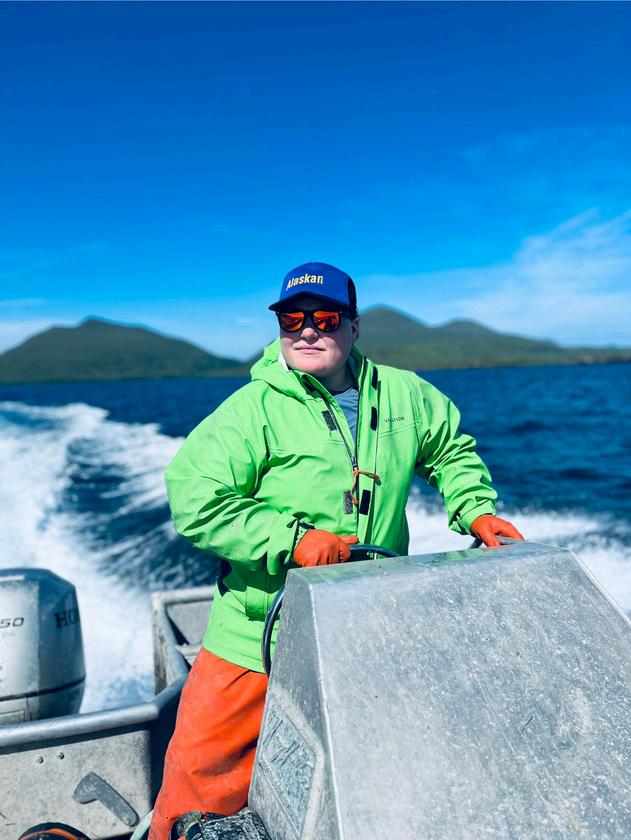
We’re also excited to share this impact report with you. AMCC’s commitment to fostering the health and prosperity of our fisheries, ecosystems, and communities is reflected on these pages, and none of this has been possible without you. Together, we are strengthening connections across all regions, ensuring that the voices and needs of our fish-reliant communities are heard and represented in the decisions that impact us.
In the coming year, one of our top priorities is to engage more directly and meaningfully with you, be it at a happy hour, policy meeting, or over coffee. Please share your thoughts, challenges, and hopes with us. How can we better support you? Your voice matters, and we ’ re here to amplify it.
Thank you for being part of this extraordinary community. Here’s to another incredible fishing year filled with collaboration, growth, and shared success.
Good Fishing!

MICHELLE STRATTON
Executive Director
AMCC’s mission is to protect and promote the integrity of Alaska’s marine ecosystems and the health of ocean-dependent communities.


Learn more about AMCC’s current staff & board, akmarineorg/our-story

/AlaskaMarine
/ak.marine

/ak-marineconservationcouncil
AMCC wishes to thank outgoing staff Marissa Wisniewski, Katy Rexford and board members Dave Theriault and Josh Wisniewski for their contributions
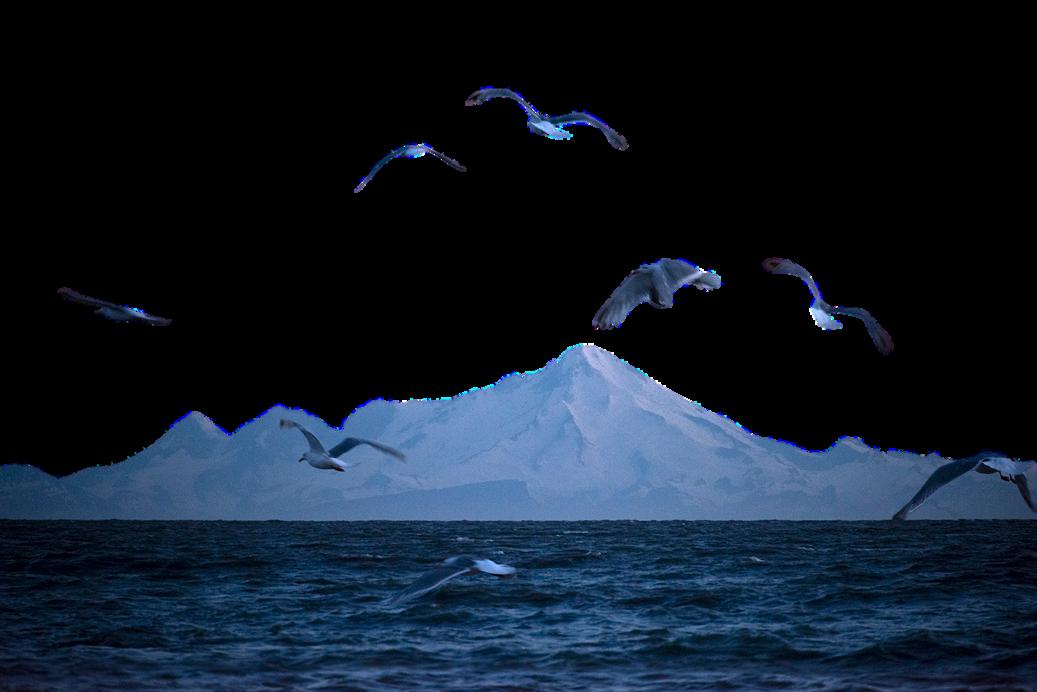

Sept.2023
Oct.2023
Dec.2023
HelpedMobilizeVoicesinLowerCookInlet&GulfofAlaska Wesupportedlocalstakeholderstoadvocateforfisheriesecosystems.
AMCCAttendedNPFMCtoAdvocatefor: Chumsalmonbycatchlimits
Observersafetyimprovements
RecognitionofLocal&TraditionalKnowledge
LaunchedFishermanPolicyEngagementToolkit MadetoempowercommunityvoicesatBoardofFisheriesmeetings.
HabitatDefense
WeattendedNPFMCtoprotectessentialfishhabitatintheBeringSea, Aleutians,&GulfofAlaska.
HostedTHEDEEPEvent
GuestSpeakersDennisLees,CarmelFinley,&SteveLangdonexplored seafloorfunction,fisherieshistory,&valuesbeyondcapital
LawsuitFiled
Bottomtrawlfleetsuedtoblockhalibutbycatchrule;AMCCintervenedin courtwith11alliesandlaunchedagrassrootsfundraisingcampaignto supportthelegalfight
Feb.2024
AdvancedPublicCommentThroughTwoKeyAdvocacyOpportunities
Protectseafloorhabitatfrom“midwater”trawlgear SafeguardTannercrabfrombycatch




Mar.2024
Apr.2024
Presentedatthe9 WorldFisheriesCongress th
“TheMythof‘Mid-water’intheAlaskaPollockFishery”expressedourconcerns about“pelagic”trawlsoperatingontheseafloor.
ReturnedtoNPFMC
Weadvocatedforeffectivesalmonbycatchsolutions&researchpriorities.
CrewmemberTrainingBegins
AKOn-Board,aprojectfundedbytheYoungFishermen’sDevelopmentAct, launchedinSitka.
PolicyinDC
WemetwithCongresstochampionequitable,sustainablefisheries,andworking waterfronts
ClimateResilienceWorkContinues
Wecalledforimproveddeliveryofservices,info,andsupportforclimate-smart fisheriesduringtheNPFMCworkshophostedinKodiak.

FightingforReform
Wecalledforstrongerprotectionsagainstpelagictrawldamage&holistic harvestdecisionsattheNPFMC
ServedontheAlaskaSalmonResearchTaskForce
Amongtopconcerns:foodavailabilityforsalmonandwarmingoceantemperatures. AMCChelpedtoensuresoundscienceandfishermen’sinputwasrepresented.
VictoryforHalibut!
Courtupheldtherulelinkingbycatchlimitstoabundance;amajorwinforfish, communities,&conservation!




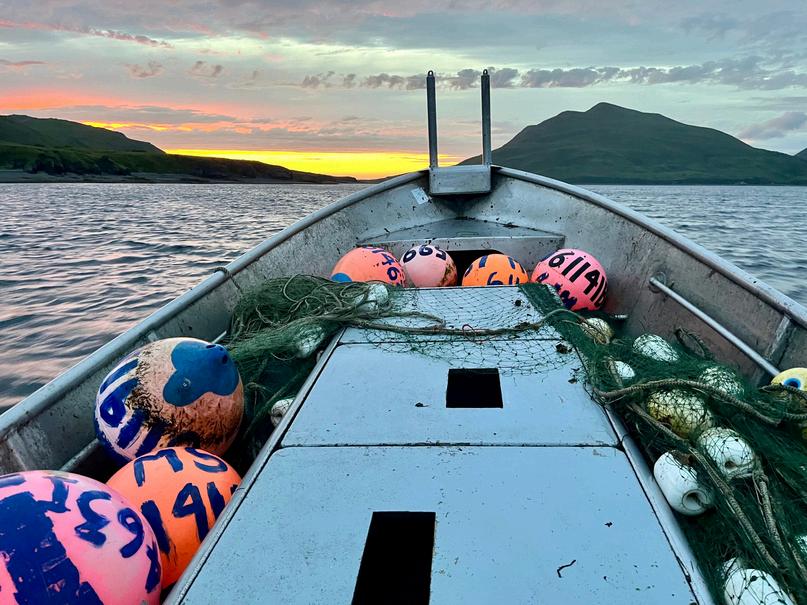

Thanks to you, AMCC was hard at work in FY2024 advancing sustainable, equitable, and climate-resilient fisheries—efforts that continues today. We're excited to share our latest impact updates Stay engaged, keep raising your voice, and help us make a difference when we send out Action Alerts Together, we can protect Alaska’s marine ecosystems, wild fisheries, and the communities that depend on them.
Essential Fish Habitat (EFH) is the backbone of healthy marine ecosystems. It provides shelter for marine species, supporting their survival, recovery, and long-term resilience Protecting seafloor habitat, like old-growth forests, is vital it maintains biodiversity, sustains fish stocks, and mitigates climate change.
Industrial-scale bottom trawling remains a key focus of AMCC’s work In recent years, we’ve raised the alarm on pelagic (midwater) trawl nets damaging the seafloor while targeting pollock the largest fishery in the U.S. Research presented at the North Pacific Fishery Management Council (NPFMC) revealed a troubling truth Depending on the fleet, midwater trawlers operate on the seafloor 40% to 100% of the time, sometimes in waters closed to bottom trawling. One example is the Red King Crab Savings Area, which was created to protect fragile ecosystems and crab while they are mating and molting especially vulnerable times.
In FY2024, AMCC continued to share the "Myth of ‘Mid-water’” white paper, engage stakeholders to testify at fisheries meetings, and push for enforceable definitions and performance standards for pelagic trawl gear
We continue to fight for accountability and stronger protections Every wave of advocacy brings us closer to securing the future of Alaska’s oceans, wild fisheries, and fishing communities
We continue to fight for accountability and stronger ecosystem protections.
Salmon-dependent communities along the Yukon and Kuskokwim Rivers and the Norton Sound Region face a crisis Chinook and chum salmon populations have plummeted, yet they continue to be caught as bycatch in the Bering Sea pollock fishery Some members of the NPFMC have acknowledged the severity of the situation. Still, instead of taking immediate action, they’ve opted for further analysis to weigh the “tradeoffs” of potential chum salmon bycatch limits. Meanwhile, there has been no movement on Chinook Salmon bycatch.
This delay is unacceptable. We advocated at NPFMC meetings, calling for urgent and meaningful action to curb bycatch and protect these critical salmon runs. These communities deserve more than studies they need real solutions now, and our commitment continues.

Change doesn’t happen without advocacy.
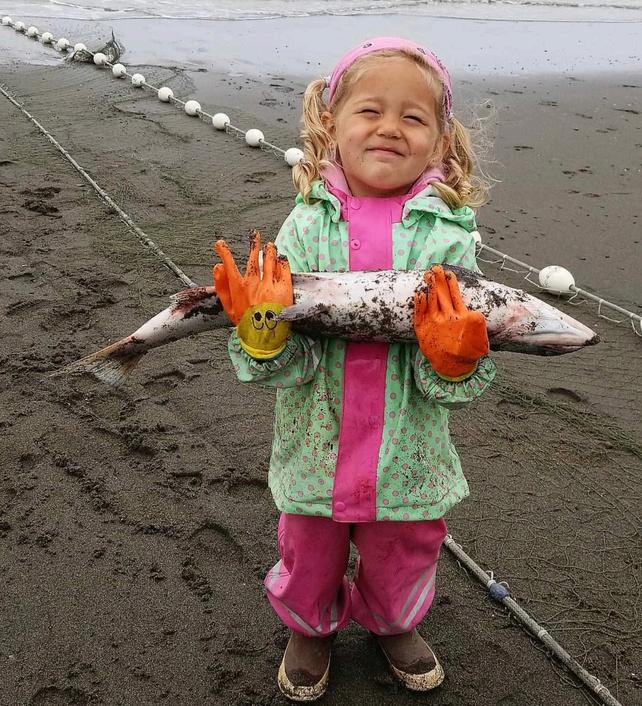
We’re committed to moving climate conversations forward in Alaska communities. At the same time, we continue advocating for science-based, climateaware fisheries management that keeps Alaska’s oceans, wild fisheries, and communities strong for generations.
Climate change is reshaping Alaska’s fisheries, and AMCC is working to ensure management decisions acknowledge these challenges and plan for the future.

In FY2024, we continued to raise awareness about fishermen's crucial role in adapting to climate impacts, advocating for stronger policies supporting resilient fisheries. At the NPFMC, we amplified findings from the Council-hosted Climate Scenario Workshop, helping advance shortand long-term strategies safeguarding marine ecosystems and fishing communities.
Beyond policy efforts, we worked directly with Sitka, Kodiak, and Cordova fishing communities to identify localized vulnerabilities and plan for climate-driven changes We can better understand risks, share knowledge, and develop solutions that protect fisheries and livelihoods by bringing stakeholders together.
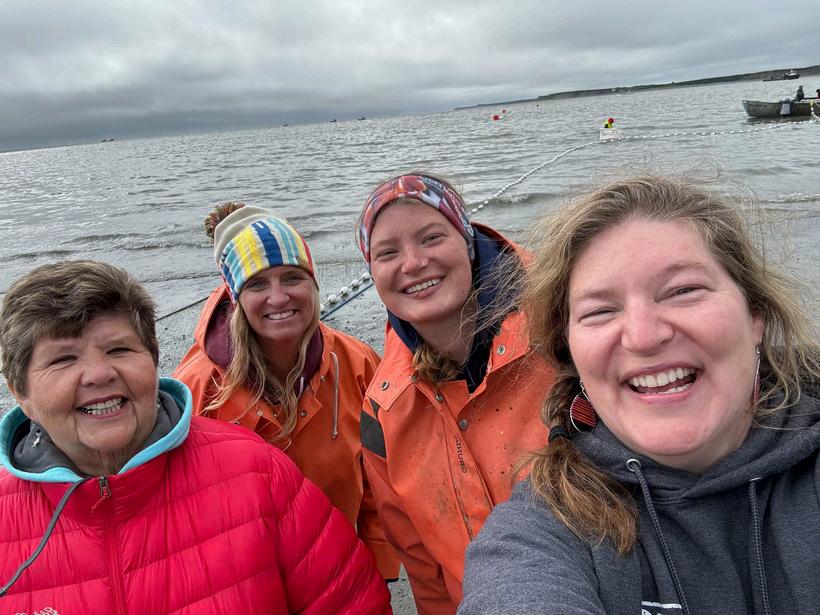
There is a shared pride for meaningful work and a fierce commitment to sustaining their fishing heritage revealed between words of wisdom, heartfelt interactions, and humorous memories.
In Naknek, Alaska, a family’s fishing legacy spans nearly 70 years, anchored by matriarch Betty Bonin and the family’s set net site, which she purchased from her mother to keep in the family Betty, or Betz, as she’s known to family and friends, recounts that at the time it was a difficult decision, but ultimately, she couldn’t let it go: “We’re going to fish.”
Her daughter, Rhonda Wayner, gets a bit emotional reflecting on that choice. “We wouldn’t be fishing if it wasn’t for my mom,” she says. Now Rhonda is trying to carry on that tradition, hoping her daughter, and Betz’ granddaughter, Harmony Wayner’s generation will continue to “honor one another through the fisheries, as long as they’re around.”
Betz is retired now but not really Each season, she’s back at fish camp, running the kitchen and staying involved in the operation. “I keep busy in the summertime. It’s fun when they’re all here,” she says, referring to her family and close friends. The three chuckle about their busy lives and one of Betz’ favorite sayings at camp: “If you’re bored, I’ll give you something to do.”
That balance of grit and laughter is part of the wisdom Betz has passed down She’s always encouraged her family not to quit their day jobs hard-earned advice from years of lean fishing. Rhonda and Harmony have taken that to heart. While they fish their site every summer, both also run consulting businesses and wear other important hats that keep them busy the rest of the year But first and foremost, they’re all fisherwomen
For the rest of the Bonin/Wayner Family story, check out our blog.
First and foremost, we are all harvesters.
AT STAKE. Each year for over a decade, an average of threequarters of a million Pacific halibut had been caught and discarded, living or dead, in the Bering Sea by

a factory bottom trawl fleet from outside Alaska, while directed and subsistence halibut fishermen struggled. Last year alone, a combined 4.5 million pounds of halibut in the Bering Sea and Gulf of Alaska were destroyed. Addressing the staggering waste caused by these trawlers dragging their nets along the ocean floor while fishing for their targeted species like sole has been one of AMCC's top priorities for years.
BACKGROUND. In December 2021, after six years of advocacy by AMCC alongside our allies and partners, the North Pacific Fishery Management Council (NPFMC) took final action to deal with this crisis, specifically addressing the bottom trawl fleet responsible for most of the halibut bycatch. It approved an Abundance-Based Management (ABM) plan, establishing a bycatch limit for the fleet based on halibut abundance levels and no longer static caps, which at the time represented a 25% reduction from the current limit AMCC and our partners had long advocated for ABM as a key solution to the crisis. For years leading up to this final decision, we educated and activated you - our community - to join us in raising your voices.

Gratitude. Thank you to everyone who helped us give halibut their day in court! Special shout out to our fellow Halibut Defense Alliance members: Central Bering Sea Fishermen's Association / City of St Paul / Alaska Longline Fishermen's Association / Fishing Vessel Owners' Association / Homer Charter Association / The Boat Company / Petersburg Vessel Owners' Association / Halibut Association of North America / North Pacific Fisheries Association / Aleut Community of St. Paul / Seafood Producers Cooperative

ROADBLOCK. Days before the ABM rule was to take effect in January 2024, the bottom trawl fleet filed a lawsuit to prevent it. While we eagerly awaited this critical halibut protection measure to take effect, the waste continued In response, AMCC and our partners formed a coalition to help defend the rule in court We worked to ensure the administrative record was inclusive of vital information for a successful outcome, provided what financial support we could to help cover legal fees, and secured additional support from our dedicated community.
WIN! Intervening was an expensive but essential step in defending the rule and it paid off! In November 2024, the court upheld the ABM rule. As a result, the halibut bycatch limits recently put in place for the trawl sector responsible for the majority of the bycatch are now in effect. AMCC is now
monitoring its implementation to ensure it benefits the long-term conservation of the species, fishing families, and halibutdependent communities throughout the Bering Sea and along the West Coast, as intended.
W I T H T R E M E N D O U S G R A T I T
AMCC’s work is grounded in and made possible by community. These connections bring added resources, capacity, knowledge, and joy to our common vision of a healthy and vibrant future for our oceans, fisheries, and fish-first communities.
We want to acknowledge the many hardworking and inspiring individuals, businesses, foundations, partners, and allies we
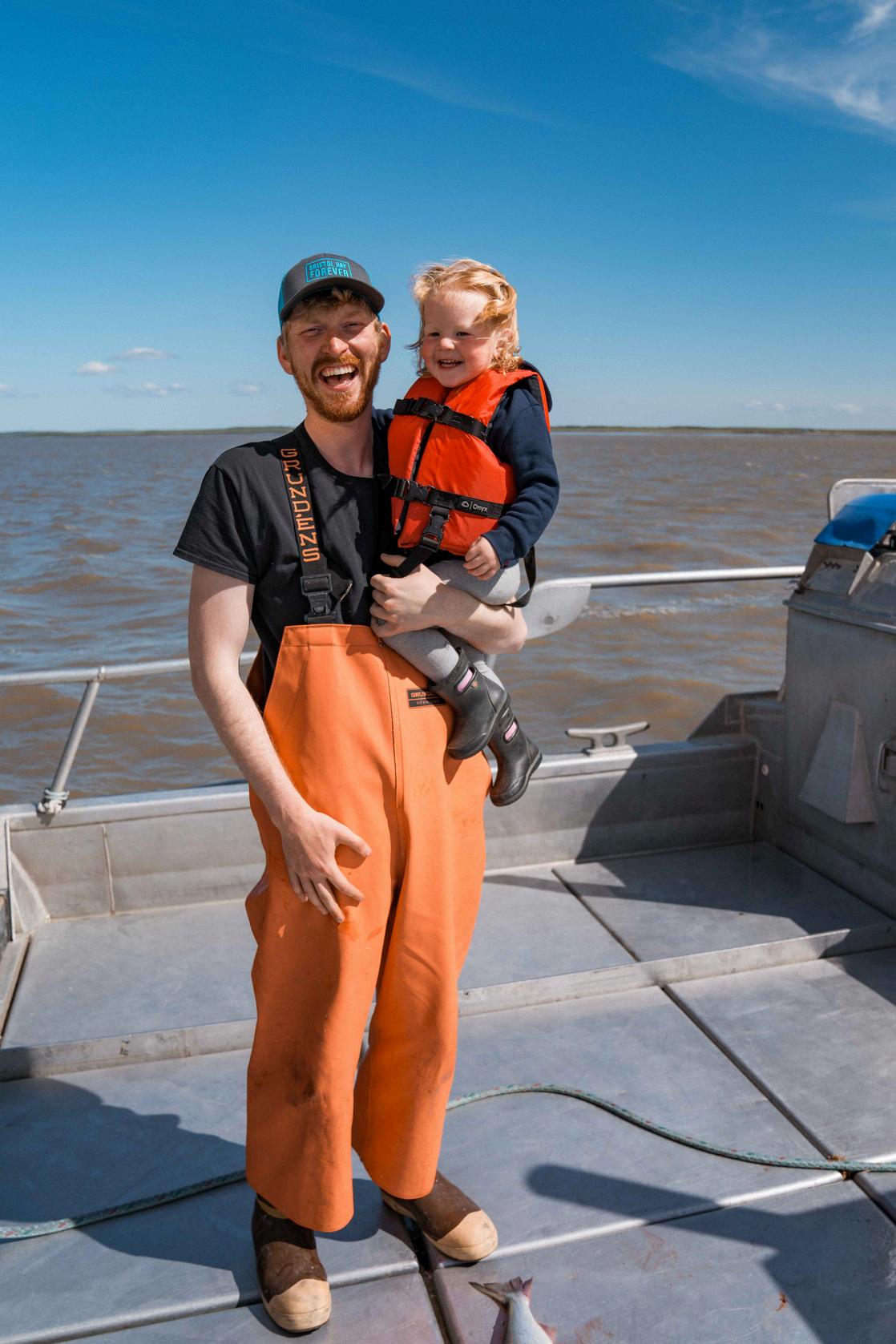
work alongside in communities throughout Alaska and across the countrythey are too many to name individually on the pages of this brief report. We appreciate you! Thank you!
OUR MISSION
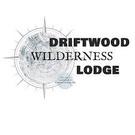


If your company’s values align with AMCC’s mission, consider becoming a business member today Learn more here
Y 2 0 2 4 F I N A N C I A L S U M M A R Y
To request a copy of AMCC’s FY2024 Financial Review or 990, please contact us at fish@akmarine org
AMCC was founded by fishermen for fishermen, with our livelihoods and the health of our oceans top in mind. We can’t do this work without you. There are many different ways to support AMCC - from the supermarket to the stock market - and everywhere in between. Every critical dollar raised keeps us fighting the good fight! Check out all the ways there are to support AMCC!
MEMBER!
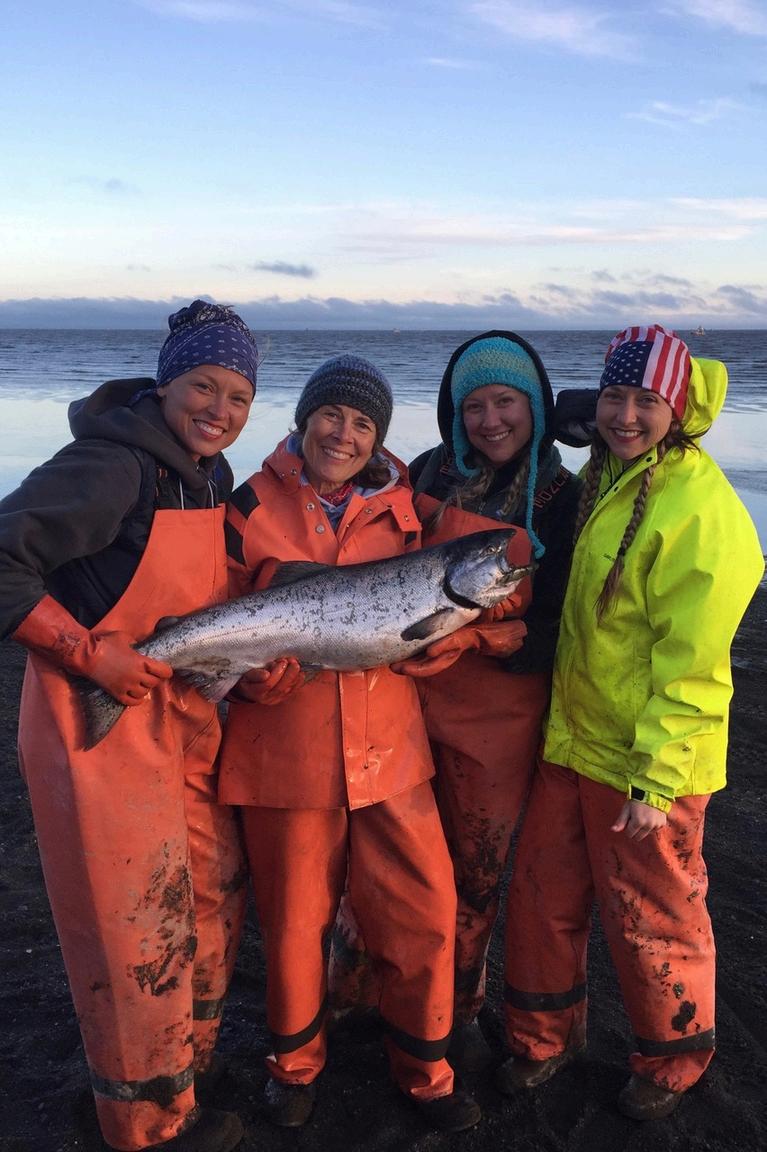
Like the tides, AMCC can count on recurring gifts Even small donations through our Tide Pool Monthly Giving Club can have a big impact. These funds allow us to be better positioned to safeguard Alaska's ocean, fisheries, and communities and you, a budgetfriendly way to support a cause you care about.
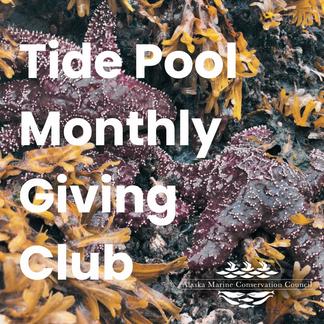


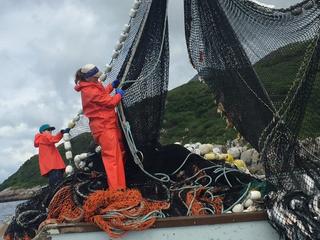
the Kuskokwim; T Vicente; August 2021
Page 2: Captain Michelle Stratton; M. Stratton; Summer 2024.
Page 3: Gulls linger at midnight against a background of Ch’naqal’in (Iliamna Volcano) during a 24 hour dipnet period; S Allyn; July 2021
Page 5: 2nd Place Best Family Three generations; ASMI/A. Wlaysewski; August 2021.
Page 6: Buoys in the bow; M. Stratton; August 2024.
Page 7: Salmon Seine on Deck; ASMI/C.M.; June 2015
Page 8: 6th generation fisherman Freya; L Rodgers; 2024
Page 9: Photo courtesy of the Bonin Family.
Page 10: Family & Community; ASMI/M. Box; November 2024.
Page 11: Halibut Illustration; ASMI; January 2010
Page 12: Nels & kiddo; N Ure; date unknown
Page 13: Rootvik Sonja Family with salmon ASMI/S Rootvik; September 2018.
Page 14 L to R: Cleaning Rockfish and Halibut; ASMI/J.R.; May 2015
Crewman Dwayne and dog Charlie coming back to the boat, Kodiak Island Alaska; E Pestrikoff; date unknown.
Seining; T. Peterson; date unknown.

Gratitude.
Thank you to the Alaskan small-boat fishermen and the coastal, river and working waterfront communities that continue to inspire us
Thank you to the AMCC Board of Directors. Thank you to the current AMCC Team and past leadership. We are grateful for you. Thank you to our members and supporters.
